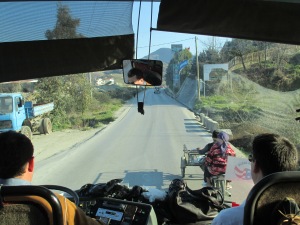The Peace Corps is difficult in ways that you can never expect, which is why HQ supplies us with this magical graph. Its kind of creepy how accurate it is. My Peace Corps experience has followed this graph to a t. During the low weeks, it is relieving to look forward and see that things will inevitably look up. During the high weeks, the graph is a terrifying premonition (joking….kind of).
Its kind of creepy how accurate it is. My Peace Corps experience has followed this graph to a t. During the low weeks, it is relieving to look forward and see that things will inevitably look up. During the high weeks, the graph is a terrifying premonition (joking….kind of).
The point being, for every struggle, there is a high point. Eventually, and its unavoidable unless you hide inside all day, every volunteer has that week where they think “this is why I joined Peace Corps”.
I just had mine and I am going to use this post to brag a little bit. If you are wondering what I have been working on in Albania, this is a post for you…
1. Community Banking – So my primary project has been promoting different community banking models. Several months back I partnered up with another volunteer and a fantastic non-profit in northern Albania and they agreed to give the project a try. Since then we have been slowly researching, planning, and organizing. As of Sunday, the project has officially begun! For a test project, we created a hybrid of a ROSCA and an ASCA. For now, the members are all contributing towards a common fund and every meeting one member takes home the entire fund (feel free to contact me for more details). Slowly, we are working to improve member trust and develop a lending mechanism. With the test project started, I can finally start to train other groups around Albania and create a network of small community banks!
2. Peshkopi Youth Center – Nothing is better for a volunteer than when a HCN (host country national) comes to us with a project. Most of the time when we come up with a project idea, we struggle to find the support needed to implement or sustain it. So when motivated, intelligent, young people come to us looking to make a positive mark on their community, it makes us want to cry with happiness. On Wednesday, such an individual approached me and pitched me his very well thought-out idea for a youth center similar to an American Corner. It will be a place where youth can study, hang out, read, and play games. The community can also use the room to hold lessons and clubs (such as my Chess Club). Several of the nonprofits around Peshkopi have offhandedly mentioned the need for such a space, so I agreed to help him! While we are still in the planning stages, I am excited to see where it goes.
3. Integration – Living in a heavily Gheg town can be very difficult. Every Volunteer faces moments where they feel alone and outside of the community. This week though was the opposite. I have recently gotten into a nice daily pattern including lunch at my favorite “diner” and then working in my favorite cafe with a magnificent view of the snow-capped mountains. The nice part of my annoyingly unchanging routine is that the waiters and regulars all know my name and we have built up relationships. Its nice to sit down and hear the waiters and a couple regulars turn and say “Pershendetje, Beni (Hello, Benny)”. Kinda of like my own personal Cheers. Also helps that my Albanian is finally becoming functional.
4. Dumb luck – Nothing can go wrong this week. Exhibit A) Someone is sending me real BBQ sauce and mustard. B) My pierogies came out great. C) And finally, when I was walking hom last night in the dark, I missed falling in a huge death-trap of a hole by about three inches. Invincible.
The moral is for new volunteers and potential trainees. Your first year is going to be some degree of hell, but it will all come together, and when it does everything will be well worth it.
PS. If this is the apogee of my service, where is the nadir? Is “Beni meets a hole: the sequel” quickly approaching?


































